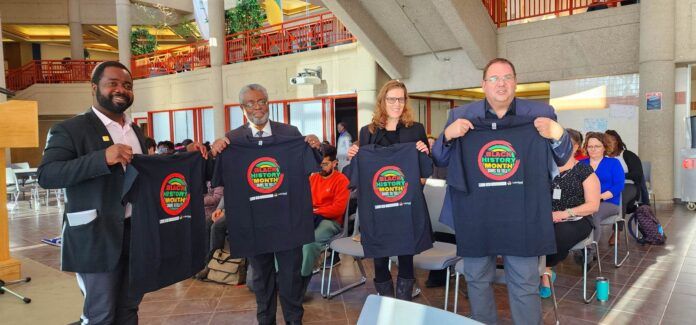A visiting lecturer at Lakeland College is discussing the sharing of the burden between all peoples in the alleviation of the divisions between Blacks and Whites.
Professor Andy Knight from the University of Alberta spoke at the Lloydminster campus on the occasion of Black History Month activities being observed on both campuses of the college for the first time.
“This is not just a problem for people of colour, Black people and Indigenous folks who have been marginalized as well because of colonization – this is a problem for White folks as well. In other words, the burden has to be shared by both Whites and Blacks, if we are going to overcome this artificial, binary condition of separating Blacks from Whites.”
Knight expressed his delight that Lakeland College is having “a major event” for Black History Month as people try to understand, “the lived experience of Black people and the problems that they face since Slavery.” He says the legacy of Slavery has led to Black people feeling marginalized and isolated from the mainstream.
He says the construction of Whiteness took place in Barbados in the Caribbean in 1661 through the Black Slave Code. It legally set up a division between the White plantation owners and the Black Slaves who worked for free to make the landowners “very, very rich.” He says that system was the prototype from which Apartheid in South Africa has its genesis.
In his talk, Knight dealt with the issue that White Slave owners even after Slavery and the Slave Trade had ended received compensation from the British government.
In Britain, the slave tax was paid by citizens up until 2015 as the government in 1833 borrowed about 40 per cent of its budget – about 17 million pounds by today’s standards, to pay Slave owners for their losses.
“The White Slave owners received reparations from the British government and they didn’t think about giving reparations to the Black Slaves – in fact they had nothing. Many of them went on to continue to perpetuate Slavery through something called Apprenticeships – where they worked for nothing, literally, or maybe got a little parcel of land which was still owned by the plantation owner,” says Knight.
Knight sees this as linked to the historical legacy of Slavery today. The issues of suffering are intergenerational, and as well a built in structural racism, coupled with illnesses like diabetes and high blood pressure which the descendents of slaves have inherited from their ancestors being fed a particular diet, notes the professor. He says being less than human meant that you did not have a right to property, wealth creation and as well as proper health.
“So no wonder we have today, Black people who are suffering from health conditions, from heart attacks and hypertension – because they were fed a certain diet that was not good for them. And they continued to eat that diet, long after Slavery was abolished because they got used to it. Lots of sugar, lots of fat – a lot of cholesterol. It’s just been a disaster.”
Knight says he is trying “to put flesh on the bones of E.D.I” – that’s equity, diversity and inclusion at the University of Alberta. So apart from his teaching, he is also doing administrative work. He says the U of A is making strides. They have added 12 new Black faculty members to the some 20 Black faculty staff at the U of A. He says not as “tokens”, but as “people of substance” who are “extremely excellent” researchers.
On the issue of reparations and exactly what has become of the profits of Slavery in Canada he feels there needs to be more scholarship to trace the wealth created by Slavery.
“Not enough is being done about that in Canada. I don’t think enough people are doing research in this area. I am one of them trying to understand the impact of the legacy of Slavery and what that has meant. We have had a few cases recently of people like the Drax family who have made millions of dollars on the backs of slaves.”
The Drax family are central to Slavery in Barbados and Richard Drax, an MP in England is in conversation with the Barbados government about what reparations would look like. When Slavery ended one of Drax’s relatives earned in today’s dollars some three million pounds for his nearly 200 Slaves. Drax has said that his family’s involvement in Slavery is “deeply regrettable.”
Knight credits his work with from his time in the Caribbean to Vice Chancellor of the University of the West Indies Sir Hilary Beckles who has highlighted the Black Slave Code and as well heads up the Caribbean Community’s Reparations Commission and he says the United Nations is also asking Beckles to lead its reparations effort.
Knight told his audience that he sees the death of George Floyd as a modern reminder that we have not overcome the legacy of the Black Slave Code which has influenced not just Apartheid, but was also used as a model in the southern United States.
Knight in telling the stories of Black people in Canada celebrates the legacy of Canada’s first Black broadcaster Felix “Fil” Fraser who among other things wrote a book titled How the Blacks created Canada in which he looked back to the 1600s African navigator, Mathieu De Costa who used his knowledge of Indigenous languages to communicate between Europeans and Aboriginal people in what would eventually become Canada. He recommended this book to his audience.
Knight concluded by celebrating with a quote from Bob Marley’s Redemption Song, “Emancipate yourselves from mental Slavery – none but ourselves can free our minds.”




